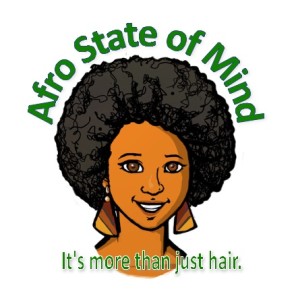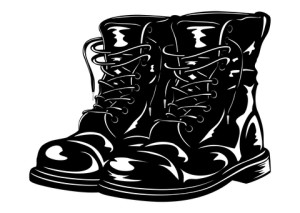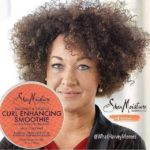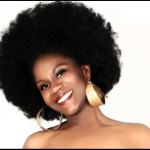(Unless He Can’t Get Anyone Else to Fight in His Wars)
When creating a war ready military unit, the concept of “uniformity” is important. But concepts of uniformity do not exist in a vacuum. When military norms have their roots in a society that is permeated with a racist ideology (one that says Whiteness and all things associated with it are superior and that Blackness and all things associated with it are inferior), the way the military defines “uniformity” can also be racist.
When the Army needed people to fill the front lines in Iraq and Afghanistan, they had no problem targeting Black and Brown communities to fill their ranks. Remember the Army commercials that used to flood BET shows and any televised sport played by a large portion of Black athletes? Seemed like you couldn’t watch Black folks on TV without also being heavily recruited into the Army.
Like many, a number of Black women saw this as an economic opportunity to “Be All They Could Be” and signed up. In addition to serving the country, this opportunity allowed them to access benefits for school, housing and opened the doors to economic stability.
These Sisters believed in the Army’s recruitment slogans, wanted to be “Army Strong” and used service to their country as a stepping-stone to better careers.
But That Was Then…
According to their new dress code regulations, the Army’s revised hair grooming rules are designed “to maintain uniformity within a military population for female soldiers.”
Taken on its face without any context this goal sound harmless enough. But that’s the problem with racism. It works especially well in circumstances where you don’t have any actual real world application. But as I previously noted:
“When your ‘uniform’ or ‘norm’ is based on a standard that is race-specific, then your regulations will produce racially disparate outcomes. Here the rules are based on European straight hair as the norm from which other types of hair deviate. This baseline ‘norm’ is defined by a Eurocentric standard of beauty and normalcy. So, by their very nature, the regulations make caring for and wearing ethnically-Black-hair against the law. This presents an undue burden on Black women and is another example of the ways in which Black women continue to be victimized by institutional racism in the workplace.”
Your Hair Ain’t Like Mine
“Ethnically-Black-hair” is a term used to describe the type of hair that is indigenous to many Black people. It is the type of hair that is more kinky/curly/nappy than straight. Ethnically-Black-hair is genetically programmed to grow out—not down. Many Black women undergo dangerous chemical processes or pay hundreds if not thousands of dollars to straighten their ethnically-Black-hair and remove the curl pattern so they can wear it straight. As noted by Huff Post contributor Ama Yawson, many choose this option because:
“For the most part…white womanhood and the straight hair associated with white womanhood are promoted as the ideal of female beauty and female humanity in television, in magazines and even by our own U.S. army.”
Dear Uncle Sam: Black Hair Is Not a Brown Version of White Hair
As with most employers, the “need for uniformity” is often HR code for “look as Caucasian in appearance as possible.” Evidently the Army forgot that Black hair is genetically programmed to grow out, not down. As I’ve said before,
“Black hair is not the same as White hair. It doesn’t act the same, grow the same or look the same. And it is not supposed to because “Black people are not dark skinned White people.” Black hair is nappy because of our genetics, divine intention and/or evolutionary design.”
When Army staff re-wrote the rules for hair maintenance, they also seemed to forget that:
“Ethnically-Black-hair has its own standard. That standard is not a brown version of the standard for Caucasian hair. Nappy hair has its own rules. Those rules are not a darker version of Caucasian hair rules. Nappy hair has its own needs. Those needs are not a negrofied version of Caucasian hair needs.”
When “Race Neutral” Rules Create Racist Outcomes
The new Army regulations say that Caucasian medium length hair may be worn loose and “fall naturally” so long as it doesn’t hang past the collar. Which would be fine except for the fact that ethnically-Black-hair doesn’t fall. At all. In fact, when worn loose ethnically-Black-hair tends to extend out from the head in a style typically called the Afro.
Which could be a viable option for female soldiers, except for the fact that the regulations also say “no portion of the bulk of the hair, as measured from the scalp, will exceed 2 inches.” If our soldier with medium length ethnically-Black-hair follows the rules and lets her hair “fall naturally,” she will very likely have an Afro that breaks this rule.
Thus her hair, by its very nature, violates the regulations.
Because when the Army defined “naturally” they did so according to what is natural for Caucasian hair. They could have just said “falls like Caucasian hair” but that phrasing would be considered racist on its face.
So they define “naturally” in a seemingly race-neutral way. But in practical application this definition has a racist impact.
Soldiers with long hair must style it in a way that is “neatly and inconspicuously fastened or pinned.” Which means our soldier could put her hair in a bun – another great option for ethnically-Black-hair.
But according to the new rules, the bun can’t “extend more than 3 inches” from her scalp. So if our soldier is one of many women with thick, dense, ethnically-Black-hair, known more for its “bigness” than its ability to lay flat against a scalp, she has a serious hair problem.
Unlike her Caucasian co-worker whose hair is genetically designed to lay flat.
Locks are also banned. Even Sisterlocks™, a style many Black women use in part because they are so thin that one can style them much like one would style straight hair.
Oddly two strand twists are also explicitly excluded. Unlike braids (which use three strands of hair), it is women with ethnically-Black-hair who typically wear twists (which use two strands of hair). Anyone who knows anything about ethnically-Black-hair knows that two strand twists are a default hairstyle and are the baseline on which many other ethnically-Black-hairstyles build.
However, braids—a style used by women of all hair types—are still allowed.
Now, lets sum this up: ethnically-Black-hairstyles are largely banned. But styles that White women use are acceptable.
Because, you know. Institutional racism Uniformity.
Your Blues Ain’t Like Mine
Black women soldiers are a dynamic bunch and not just for their willingness to go into battle and defend their country. As noted by the Veteran Affairs Administration:
Veterans Affairs officials have announced that studying the uniquely supportive culture of black women might provide a key to addressing the spike in suicides occurring in the armed forces… While the government does not break down military suicides according to race, among the general population African-American women have the lowest suicide rate of any group.
See Black women are fly—so fly in fact the government is studying us in order to learn how to decrease suicide rates in the rest of the military. Uncle Sam had no problem heavily marketing to Black communities when it needed bodies to fuel the war. Uncle Sam was perfectly fine with Black women “being all we can be” when the numbers of solders was on the decline. No one cared how ethnically Black a soldier’s hair was—when Uncle Sam was dodging bullets and IEDs in Iraq and Afghanistan.
But now that the wars are over winding down, Uncle Sam needs to reduce its numbers. So instead of appreciating the many gifts, skills and talents that Black women bring to the military, Uncle Sam decided to revert to age-old American racism and outlaw the very physical characteristics that define Black women’s bodies.
Can you imagine if the Army said that slanted eyes were no longer acceptable for soldiers? What if they said wide noses were against regulations? How about if they said soldiers with thin lips could no longer serve? Regardless of your feelings about the military, if you are as outraged as the rest of us are about the government engaging in blatant racism against Black hair, there is a petition that you can sign to support our Sister’s rights to live in the hair that God designed for them. It expires April 19, 2014 so please help spread the word.
Until then—if the Army cannot accept Black women for who we are and how we look—then perhaps Black women should no longer consider the Army as a viable option. The time has come for us to stop harming our selves to fit into the parameters of a standard of beauty that was explicitly designed to exclude us. Because you can’t be “Army Strong” if you can’t even be who you really are.
********
Looking for more thoughts from an Afro State of Mind? Check out my book Afro State of Mind: Memories of a Nappy Headed Black Girl now available on Amazon.com in paper back or e-book! And if you want to stay connected follow me on Twitter, “like” Afro State of Mind on Facebook or catch up on my latest youtube videos!






One of the problems I faced in the Navy was I felt like I couldn’t be who I wanted to be. I hope this makes sense. I had problems finding me because I was a sailor. The Navy wants everyone to be a sailor 24/7. Even though people would say, you could do things during your off time but I felt like my time was the Navy’s time. While I am happy I served 10 years in the Navy, I am also happy that I transitioned into a civilian. I am still trying to find out who I am but in the mean time, it’s still a journey for me. I am still learning who I am. Love your blogs Lurie!